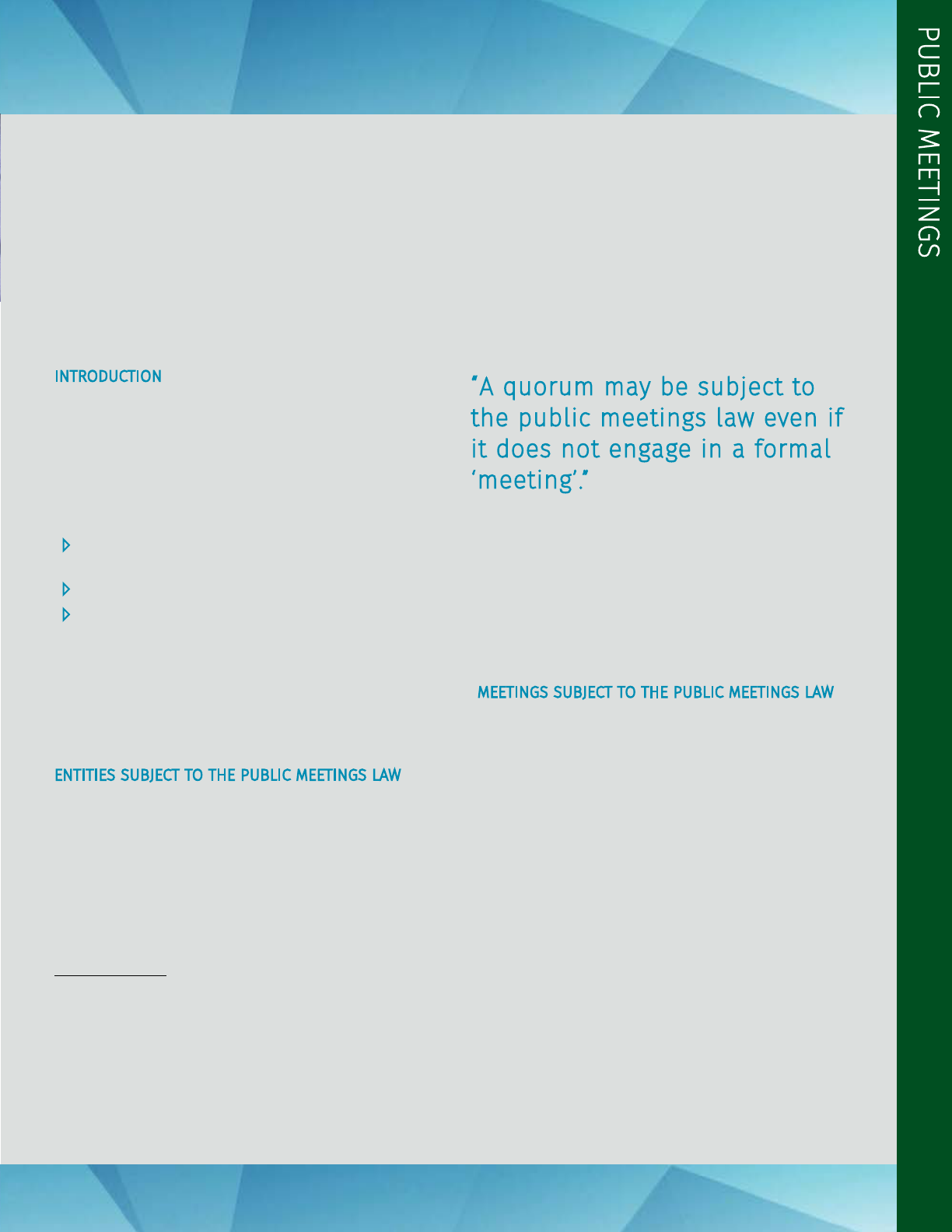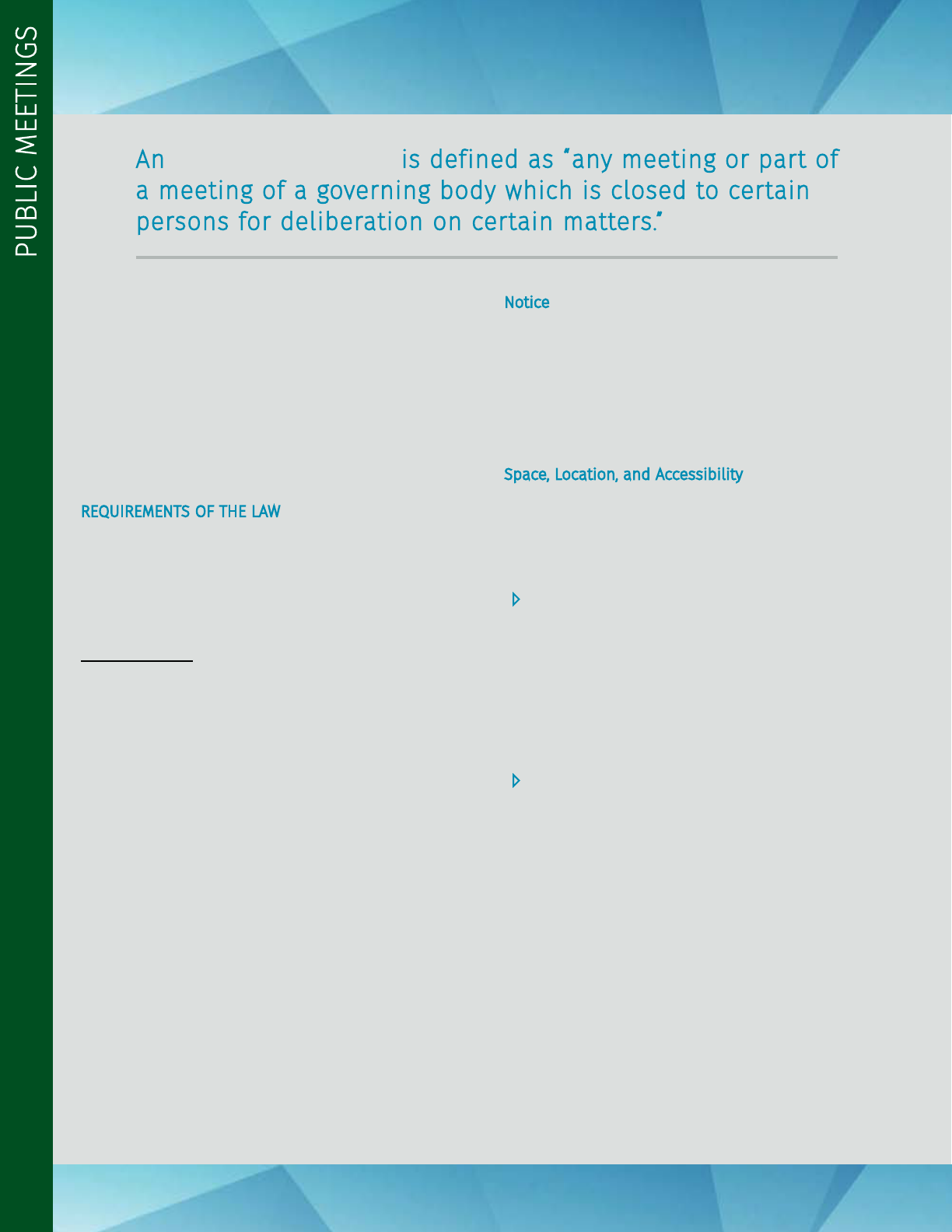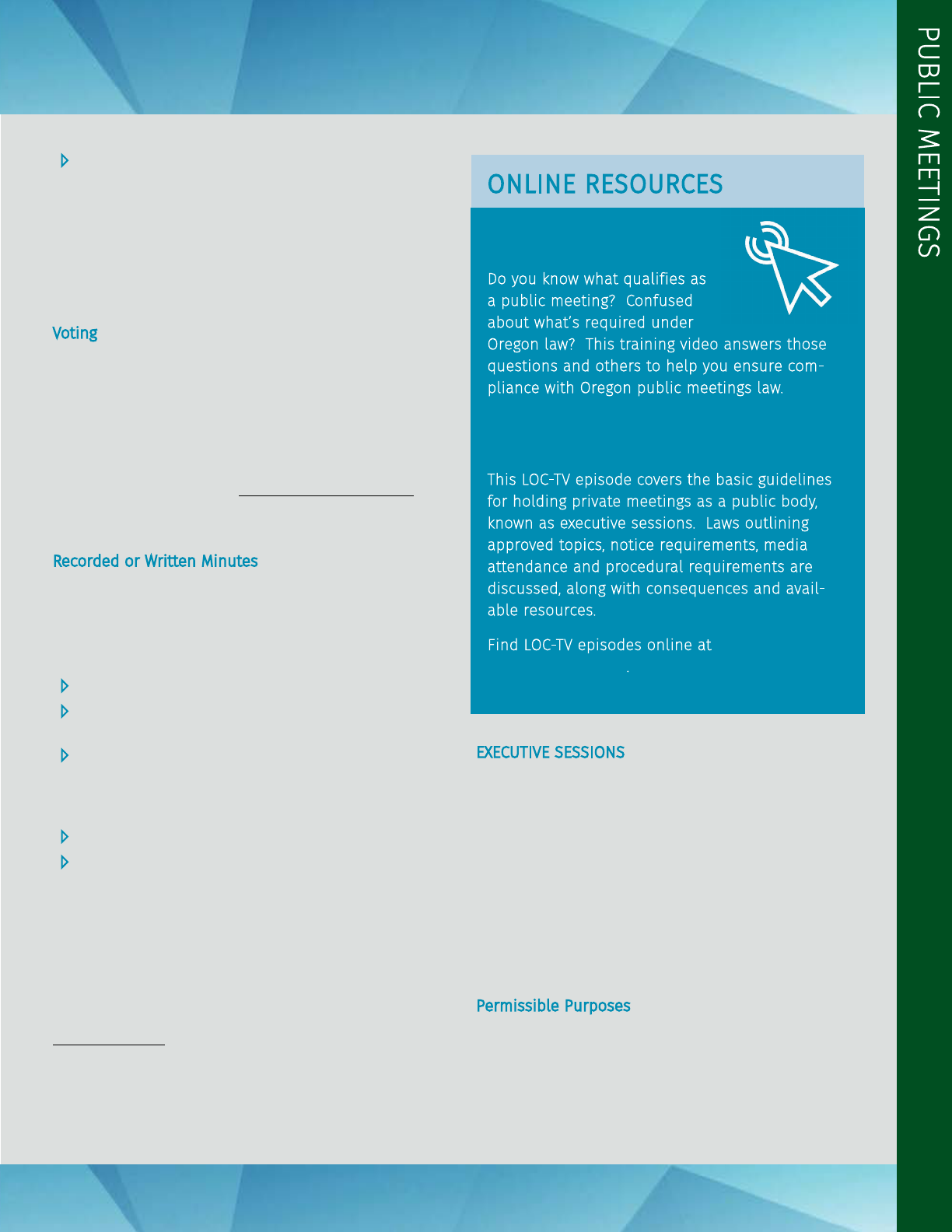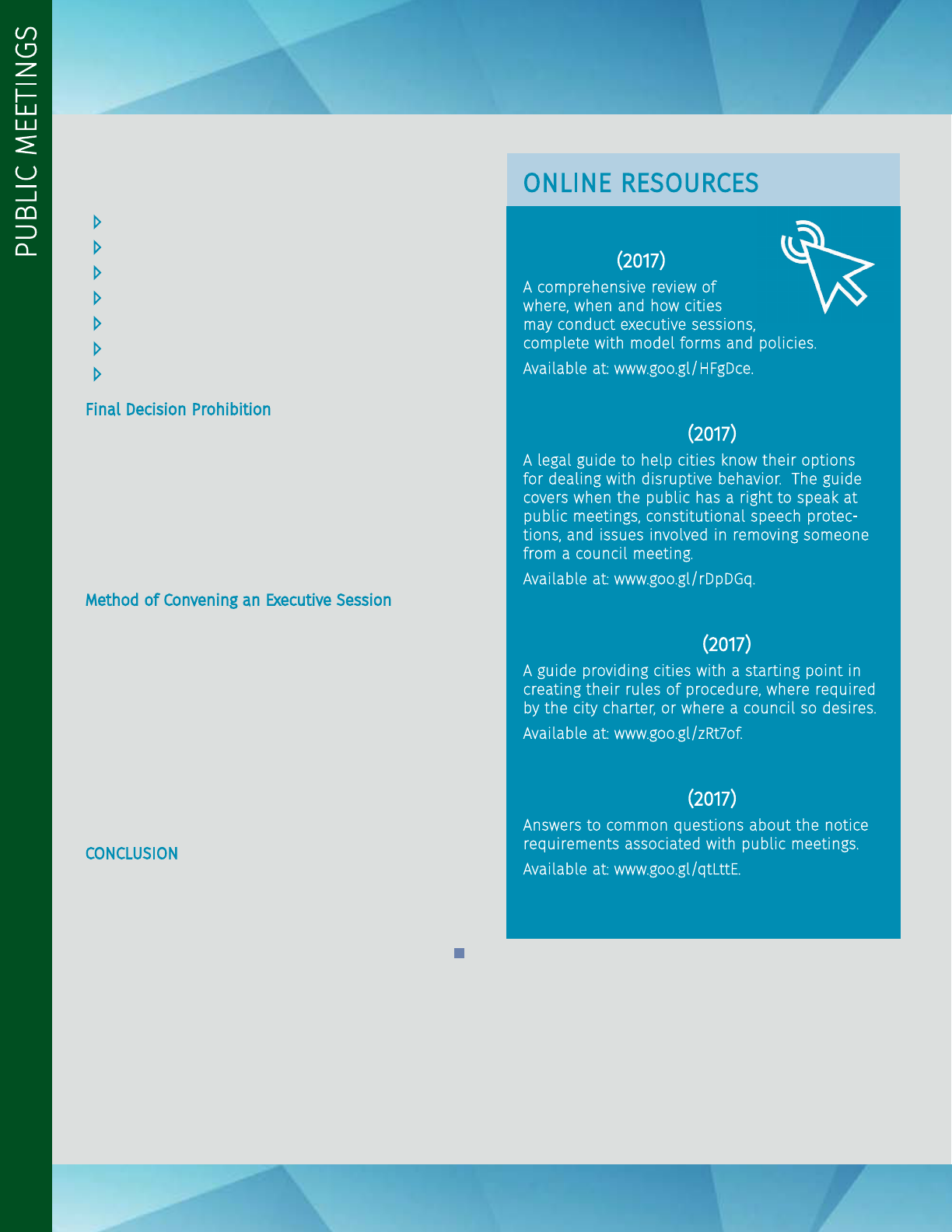
Public Meetings:
What Every Elected Official
Needs to Know
19
www.orcities.org
March 2018 | LOCAL FOCUS
PUBLIC MEETINGS
INTRODUCTION
To ensure that the public is aware of the deliberations and
decisions of governing bodies, as well as the information that
forms the basis of those decisions, Oregon law contains a
policy of open decision-making at the various levels of gov-
ernment.
1
The key requirements of the Oregon Public Meetings Law
(OPML) include:
` Conducting meetings that are open to the public—unless
an executive session is authorized;
` Giving proper notice of meetings; and
` Taking minutes or another record of meetings.
Further, the law imposes other requirements regarding loca-
tion, voting and accessibility to persons with disabilities.
Please note that this article is not a substitute for legal advice,
nor is it comprehensive. The OPML is quite complicated
and public officials are encouraged to speak with their legal
counsel for case-by-case advice.
ENTITIES SUBJECT TO THE PUBLIC MEETINGS LAW
Understanding which entities are subject to the OPML is
critical for ensuring compliance with the provisions of the law.
In short, the OPML applies to any (1) governing body of a
public body, (2) when that governing body holds a meeting
for which a quorum is required to make a decision or deliber-
ate toward a decision on any matter. ORS 192.610(5); ORS
192.630(1).
The OPML applies to meetings of a “governing body of
a public body.” A public body is the state, any regional
1 ORS 192.160 establishes Oregon’s policy of open decision-making through
public meetings:
“e Oregon form of government requires an informed public aware of
the deliberations and decisions of governing bodies and the information
upon which such decisions were made. It is the intent of ORS 192.610
to 192.690 that decisions of governing bodies be arrived at openly.”
council, a county, a city, a district, or any other municipal or
public corporation. A “public body” also includes a board,
department, commission, council, bureau, committee, subcom-
mittee, or advisory group of any of the entities in the previous
sentence. If two or more members of any public body have
“the authority to make decisions for or recommendations to a
public body on public body on policy or administration,” they
are a “governing body” for purposes of the OPML.
MEETINGS SUBJECT TO THE PUBLIC MEETINGS LAW
Not every action that a governing body takes, of course, is
subject to the OPML. The law defines a “meeting” as the
convening of any of the “governing bodies” subject to the law
“for which a quorum is required in order to make a decision
or to deliberate toward a decision on any matter.” Thus, the
definition of a meeting has three elements: (1) the conven-
ing of a governing body; (2) for which a quorum is required;
(3) to make a decision or deliberate toward a decision on
any matter. The first of those elements was addressed in the
previous section.
The term “quorum” is not defined in the OPML. For cities,
quorum requirements are often set by charter, bylaws, council
rules, or ordinance. A gathering of less than a quorum of a
“A quorum may be subject to
the public meetings law even if
it does not engage in a formal
‘meeting’.”
(continued on page 20)
LOCAL GOVERNMENT BASICS

Public Meetings
20
LOCAL FOCUS | March 2018
www.orcities.org
governing body of a public body is not a “meeting” under the
OPML.
2
Finally, staff meetings are typically not covered by the OPML,
as they are usually held without a quorum requirement. A
staff meeting called by a single official is not subject to the law
because the staff do not make decisions for or recommenda-
tions to a “governing body.” Importantly, however, if a quo-
rum of a governing body, such as a five-member commission,
meets with staff to deliberate on matters of “policy or admin-
istration,” the meeting is within the scope of the OPML.
REQUIREMENTS OF THE LAW
The last two sections covered which entities are subject to the
law, and what meetings of those entities trigger the OPML.
This section addresses the substantive requirements of the
OPML, including notice, space and location, accessibility,
public attendance, control of meetings, voting, and minutes
and recordkeeping.
2 In Handy v. Lane County, 274 Or App 644, 664-65 (2015), the Oregon
Court of Appeals held that a series of discussions among a quorum of a
governing body of a public body, even without a contemporaneous gather-
ing of that quorum—a so-called “serial meeting”—could give rise to a viola-
tion of the prohibition set out in ORS 192.630(2). In other words, even in
the absence of a formal “meeting” under ORS 192.630(1), a governing body
of a public body could violate the OPML through a series of discussions
among members of the governing body that added up to a quorum. On
review, the Oregon Supreme Court held that the evidence in the case failed
to show that a quorum of county commissioners did deliberate towards a
decision, meaning there was not violation of the OPML, and thus the court
declined to address the “serial meetings” issue raised by the Court of Ap-
peals. See Handy v. Lane County, 360 Or 605 (2016). Recently, in TriMet
v. Amalgamated Transit Union Local 757, 362 Or 484 (2018), the Oregon
Supreme Court held that ORS 192.630(2)—which states that a “quorum
of a governing body may not meet in private for the purpose of deciding
on or deliberating toward a decision on any matter”—is broader than the
requirement in ORS 192.630(1). In other words, a quorum of a governing
body may be subject to the public meetings law even if it does not engage in
a formal “meeting.”
Notice
The OPML requires that notice be provided of the time
and place of public meetings, including regular, special and
emergency meetings as defined in ORS 192.640. For regular
meetings, notice must be reasonably calculated to provide
actual notice to the persons and the media that have stated in
writing that they wish to be notified of every meeting. Special
notice requirements apply to executive sessions.
Space, Location, and Accessibility
For any meeting, the public body should consider the probable
public attendance and should meet where there is sufficient
room to accommodate that attendance. In the event of an
unexpectedly high turnout, the public body should do its best
to accommodate the greater number of people.
` Geographic Location
The OPML states that meetings of a governing body of a
public body must be held within the geographic boundar-
ies of the area over which the public body has jurisdiction,
at its administrative headquarters, or at “the other nearest
practical location.” In the case of an actual emergency
necessitating immediate action, however, a governing body
may hold an emergency meeting at a different location
than one described in ORS 192.630(4).
` Nondiscriminatory Site
Governing bodies are prohibited from holding meetings at
any place where discrimination based on race, color, creed,
sex, sexual orientation, national origin, age or disability
is practiced. A governing body may hold a meeting at a
location that is also used by a restricted-membership orga-
nization if the use of the location by such an organization
is not its primary use.
An executive session is defined as “any meeting or part of
a meeting of a governing body which is closed to certain
persons for deliberation on certain matters.”
PUBLIC MEETINGS

PUBLIC MEETINGS
LOCAL GOVERNMENT BASICS
21
www.orcities.org
March 2018 | LOCAL FOCUS
` Accessibility to Persons with Disabilities
The OPML imposes two requirements relating to acces-
sibility to persons with disabilities (see ORS 192.630(5)
(a)). First, meetings subject to the OPML must be held
in places accessible to individuals with mobility and other
impairments. Second, the public body must make a good-
faith effort to provide an interpreter at the request of deaf
or hard-of-hearing persons.
Voting
All official actions by a governing body of a public body must
be taken by public vote. The vote of each member must be
recorded unless the governing body has 26 or more members.
Even then, any member of the governing body may request
that the votes of each member be recorded. The governing
body may take its vote through a voice vote or through writ-
ten ballots, but ballots must identify each member voting and
the vote must be announced. Secret ballots are prohibited.
State law preempts any local charter or ordinance that permits
voting through secret ballots.
Recorded or Written Minutes
The OPML requires that the governing body of a public
body provide for sound, video or digital recording, or written
minutes, of its public meetings. The record of the meet-
ing—in whatever format—must include at least the following
information:
` The members present;
` All motions, proposals, resolutions, orders, ordinances, and
measures proposed and their disposition;
` The results of all votes and, except for governing bod-
ies consisting of more than 25 members unless requested
by a member of the governing body, the vote of each
member by name;
` The substance of any discussion on any matter; and
` Subject to the Oregon Public Records Law, ORS 192.410
to 192.505, a reference to any document discussed at the
meeting.
3
Written minutes need not be a verbatim transcript and sound
or video recordings need not contain a full recording of the
meeting. Rather, the record must provide “a true reection
of the matters discussed at the meeting and the views of the
participants.” e record must be made available to the public
“within a reasonable time after the meeting.”
3 Note that reference to a document in meeting minutes does not change the
status of the document under public records law. ORS 192.650(3).
EXECUTIVE SESSIONS
Governing bodies are permitted to meet in executive (closed)
sessions in certain circumstances (see ORS 192.660). An “ex-
ecutive session” is dened as “any meeting or part of a meeting
of a governing body which is closed to certain persons for
deliberation on certain matters.”
Executive sessions are not the same thing as meetings that
are exempt from the OPML. Indeed, an executive session is
a type of public meeting and must conform to all applicable
provisions of the OPML. Importantly, the authority to go
into executive session does not relieve a governing body of its
duty to comply with other requirements of the OPML.
Permissible Purposes
A governing body is permitted to hold an open meeting even
when the law permits it to hold an executive session, but a
governing body may only hold an executive session in certain
ONLINE RESOURCES
LOC-TV: PUBLIC VS.
PRIVATE MEETINGS
Do you know what qualifies as
a public meeting? Confused
about what’s required under
Oregon law? This training video answers those
questions and others to help you ensure com-
pliance with Oregon public meetings law.
LOC-TV: HOW TO DO EXECUTIVE
SESSIONS RIGHT
This LOC-TV episode covers the basic guidelines
for holding private meetings as a public body,
known as executive sessions. Laws outlining
approved topics, notice requirements, media
attendance and procedural requirements are
discussed, along with consequences and avail-
able resources.
Find LOC-TV episodes online at www.orcities.
org/training/loctv.
(continued on page 22)

22
LOCAL FOCUS | March 2018
www.orcities.org
circumstances. ORS 192.660 lists the circumstances in which
a governing body may hold an executive session. ose pur-
poses include:
` Employment of public officers, employees and agents;
` Discipline of public officers and employees;
` Performance evaluations of public officers and employees;
` Labor negotiation consultations;
` Real property transactions;
` Discussion of public records exempt from disclosure; and
` Discussions with legal counsel.
Final Decision Prohibition
e OPML provides: “No executive session may be held for
the purpose of taking any nal action or making any nal de-
cision.” Although a governing body may reach a nal consen-
sus in an executive session, the purpose of the nal-decision
prohibition is to allow the public to know of the result of any
such consensus. A formal vote in a public session satises the
requirement, even if the vote merely conrms the consensus
reached in executive session.
Method of Convening an Executive Session
A governing body is permitted to hold a public meeting
consisting of only an executive session. e notice require-
ments for such a meeting are the same as those for any other
meeting (see ORS 192.640). In addition, the notice must cite
to the statutory authority for the executive session.
Alternatively, an executive session may be called during a
regular, special, or emergency meeting for which notice has
already been given in accordance with ORS 192.640. e
person presiding over the meeting must announce the statu-
tory authority for the executive session before going into the
executive session.
CONCLUSION
e OPML is an important, nuanced law. A single article
cannot fully describe all of its provisions or how it applies in
various factual circumstances. For more detail on the OPML,
please see the Oregon Attorney General’s Public Records and
Meetings Manual (2014), available at www.goo.gl/ikzw5B.
ONLINE RESOURCES
GUIDE TO EXECUTIVE
SESSIONS (2017)
A comprehensive review of
where, when and how cities
may conduct executive sessions,
complete with model forms and policies.
Available at: www.goo.gl/HFgDce.
HANDLING DISRUPTIVE PEOPLE IN
PUBLIC MEETINGS (2017)
A legal guide to help cities know their options
for dealing with disruptive behavior. The guide
covers when the public has a right to speak at
public meetings, constitutional speech protec-
tions, and issues involved in removing someone
from a council meeting.
Available at: www.goo.gl/rDpDGq.
MODEL RULES OF PROCEDURE FOR
COUNCIL MEETINGS (2017)
A guide providing cities with a starting point in
creating their rules of procedure, where required
by the city charter, or where a council so desires.
Available at: www.goo.gl/zRt7of.
FAQ ON NOTICE REQUIREMENTS FOR
PUBLIC MEETINGS (2017)
Answers to common questions about the notice
requirements associated with public meetings.
Available at: www.goo.gl/qtLttE.
Public Meetings
PUBLIC MEETINGS
